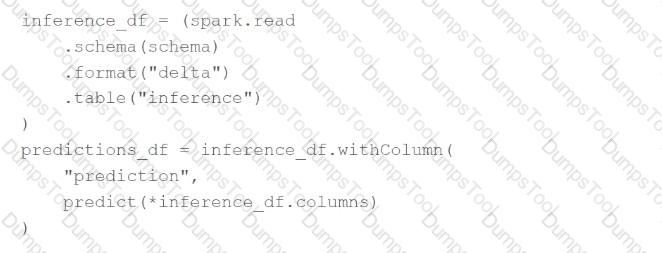Databricks-Machine-Learning-Professional Question Includes: Single Choice Questions: 60,
Which of the following MLflow Model Registry use cases requires the use of an HTTP Webhook?
Which of the following statements describes streaming with Spark as a model deployment strategy?
A machine learning engineer is using the following code block as part of a batch deployment pipeline:

Which of the following changes needs to be made so this code block will work when theinferencetable is a stream source?
A data scientist is using MLflow to track their machine learning experiment. As a part of each MLflow run, they are performing hyperparameter tuning. The data scientist would like to have one parent run for the tuning process with a child run for each unique combination of hyperparameter values.
They are using the following code block:

The code block is not nesting the runs in MLflow as they expected.
Which of the following changes does the data scientist need to make to the above code block so that it successfully nests the child runs under the parent run in MLflow?
A data scientist has developed a modelmodeland computed the RMSE of the model on the test set. They have assigned this value to the variablermse. They now want to manually store the RMSE value with the MLflow run.
They write the following incomplete code block:

Which of the following lines of code can be used to fill in the blank so the code block can successfully complete the task?
Customers Passed
Databricks Databricks-Machine-Learning-Professional
Average Score In Real
Exam At Testing Centre
Questions came word by
word from this dump
DumpsTool Practice Questions provide you with the ultimate pathway to achieve your targeted Databricks Exam Databricks-Machine-Learning-Professional IT certification. The innovative questions with their interactive and to the point content make your learning of the syllabus far easier than you could ever imagine.
DumpsTool Practice Questions are information-packed and prove to be the best supportive study material for all exam candidates. They have been designed especially keeping in view your actual exam requirements. Hence they prove to be the best individual support and guidance to ace exam in first go!
Databricks ML Data Scientist Databricks-Machine-Learning-Professional PDF file of Practice Questions is easily downloadable on all devices and systems. This you can continue your studies as per your convenience and preferred schedule. Where as testing engine can be downloaded and install to any windows based machine.
DumpsTool Practice Questions ensure your exam success with 100% money back guarantee. There virtually no possibility of losing Databricks ML Data Scientist Databricks-Machine-Learning-Professional Exam, if you grasp the information contained in the questions.
DumpsTool professional guidance is always available to its worthy clients on all issues related to exam and DumpsTool products. Feel free to contact us at your own preferred time. Your queries will be responded with prompt response.
DumpsTool tires its level best to entertain its clients with the most affordable products. They are never a burden on your budget. The prices are far less than the vendor tutorials, online coaching and study material. With their lower price, the advantage of DumpsTool Databricks-Machine-Learning-Professional Databricks Certified Machine Learning Professional Practice Questions is enormous and unmatched!
The Databricks Databricks-Machine-Learning-Professional Exam is a certification exam that assesses an individual’s ability to use Databricks Machine Learning and its capabilities to perform advanced machine learning in production tasks. This includes the ability to track, version, and manage machine learning experiments and manage the machine learning model lifecycle. In addition, the certification exam assesses the ability to implement strategies for deploying machine learning models.
The Databricks Databricks-Machine-Learning-Professional Exam covers the following topics:
The Databricks Databricks-Machine-Learning-Professional Exam consists of 60 multiple-choice questions.
The Databricks Databricks-Machine-Learning-Professional Exam has a time limit of 120 minutes.
There are no formal prerequisites, but Databricks recommends having at least one year of hands-on experience with Databricks and familiarity with machine learning concepts.
Absolutely! Our Databricks-Machine-Learning-Professional practice questions and explanations go beyond theory and focus on the real-world application of concepts. By actively engaging with our Databricks ML Data Scientist Study Guide materials, you'll gain valuable hands-on experience.
We constantly update our Databricks-Machine-Learning-Professional study material to reflect the latest Databricks features and exam content. You can be confident you're receiving the most accurate and relevant information.
Dumpstool offers a money-back guarantee if the user fails the Databricks Databricks-Machine-Learning-Professional Practice Exam.